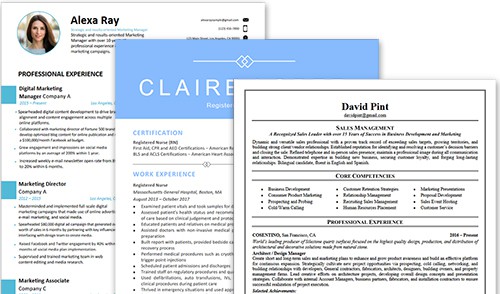Hard vs Soft Skills: How They Differ (Examples Included)
In the eyes of employers, you’re only as valuable as the skills you possess. This guide will allow you to determine what skills should go into your resume to give yourself the best shot of landing more interviews.

In the modern workforce a lot of emphasis is placed on the importance of hard and soft skills for success.
Interviewers and hiring managers are looking for candidates with a mix of these critical skills that will allow them to work as valuable assets for their employer.
Hard skills are measurable, role-specific skills that allow employees to perform specific tasks within their industry. Soft skills are personal qualities and traits that help employees succeed, regardless of their profession.
When merged together, hard and soft skills can win jobs and further careers.
But first we should look more closely at these two types of skills and how to incorporate these skills to your resume to optimize your hireability.
If you are having trouble with picking out the perfect set of skills to include on your resume or just can’t get your resume to turn out the way you want it to, consider using our professional resume writing services to ease the process.
What are hard skills?
Quantifiable technical knowledge, and experience related to an occupation, are often referred to as hard skills. These skills are gained through formal education, certifications, on the job experience, or life experience.
Furthermore, it’s usually easy to prove to someone that you have a certain hard skill. Many hard skills can be objectively verified through a degree, certification, performance metrics, and work experience.
Typically, hard skills are not broadly transferrable across industries. For example, while a software coder may be able to work in a few different areas of the technology sector, their skillset would not assist them in obtaining a job in real-estate.
Nearly every position will require certain technical skills specific to that industry. However, in some entry-level positions, the employer may not expect the candidate to already have that knowledge at the time of hire.
Proficiency in hard skills may be measured periodically during an employee’s role with a company, and some businesses require annual competency assessments or testing. During your interview presentation you should practice speaking about your hard skills and go into detail with describing each one of them.
Even if these annual skill evaluations are not required, the speed of advancement in many industries, including technology and medicine, is such that employees would be wise to continually keep their hard skills up to date through continuing education.
Hard Skills Examples:- PowerPoint
- Content Writing
- QuickBooks
- Fundraising
- Network Security
- Database Management
What are soft skills?
Soft skills, also known as interpersonal skills, are more challenging to define than hard skills. However, they are no less important to career success.
Playing an important role in effective communication, persuasion, and teamwork, soft skills shape every aspect of our work experience, from providing a successful interview to negotiating for a big raise. Even those who work remotely, or for themselves, benefit from the use of soft skills.
For that reason, it’s no surprise that many employers list soft skills, such as communication and leadership, among their position requirements.
Since soft skills are not specific to an industry, they can help empower candidates who do not meet all of the hard skill position requirements to find success in new roles. With that in mind, it may be wise to consider showcasing soft skills in resumes and interviews.
An excellent way to include soft skills in your resume is to consider using them as keywords, taking important soft skills from the job description, and working them into your document. Additionally, referring to specific hard and soft skills from the job description during your interview will help to connect your experience with the needs of your potential employer.
While it may be easier to obtain hard skills through traditional education, soft skills can still be developed and honed.
Though some people make soft skills like active listening and leadership look easy, nobody is born with soft skills, and there are many resources available to help anyone learn how to develop the right interpersonal traits for success.
Remember – practice makes perfect!
Soft Skills Examples- Dependability
- Creativity
- Humility
- Empathy
- Problem Solving
- Adaptability
What’s the Difference Between Soft Skills vs Hard Skills?
Soft skills are personal qualities, traits and habits that can help determine an employee’s success. Some important soft skills include determination, leadership, communication ability and humility, they can greatly improve the way employees interact on teams, and with managers, as well as how they handle adversity.
Hard skills are specific areas of knowledge or experience that allow an employee to succeed at job specific tasks. For instance, the ability to use point of sale software is a common hard skill. The ability to master hard skills can help employees maximize efficiency and gain credibility as experts in their fields.
The key differences between hard skills and soft skills are how they are gained and put to use in the workplace.While hard and soft skills are both perfected through experience and practice, they are typically obtained through different pathways.
Hard skills are measurable, and are often learned through courses, educational programs, life experience and on the job training. Since they are task-based, routinized practice, education and assessment can help build these skills effectively.
Soft skills are harder to measure or learn from classes or books. These skills are more complex and require the development of emotional intelligence and self-awareness for growth.
Furthermore, it is difficult to perfect these skills because there is almost always room for continued improvement in these areas. However, while some hard skills may be beyond the physical and cognitive reach of some employees, nearly anyone can develop effective soft skills with time.
How to include the right hard and soft skills on your resume
One way to effectively incorporate hard and soft skills into your resume is to make use of a Functional Resume or Combination Resume format. Both of these resume layouts incorporate a specific section into which hard and soft skills can be listed for the attention of the hiring manager.
However, regardless of the resume format you choose, it is important to make sure that skills listed in your resume align with those requested in the job description. For example, if the position lists “strong communication skills” as a requirement, make certain that you include the exact phrase “strong communication skills” in your resume.
Doing this will help you catch the attention of any Human Resources staff that may review the document, but will also assist you with getting your resume through any position management software used by the company. These programs scan resumes for specific keywords related to the job description and eliminate applications without the desired terms.
By mirroring the hard and soft skills language from the job description, you can help ensure that your resume makes it straight to the interview pool.
Another smart strategy is quantifying your soft skills by adding specific metrics, such as rates of improvement, sales totals and test scores. While this strategy works a bit easier with hard skills, you can imply your strength with soft skills by sharing the number of teams you’ve led, presentations you’ve given or peer review scores you have received.
How to showcase your skills during an interview
With a bit of careful planning, you can also use hard and soft skills to help guarantee a winning interview.
Try to anticipate some of the questions you may be asked, and consider how you can draw upon skills mentioned in the job description in your answer.
For example:
Q: “What is your greatest achievement?”
A: “I’m an excellent communicator, and last year, I led an interdisciplinary team to develop a new set of safety protocols at our company. Instead of meeting for hours at a time, we had frequent, short meetings, and used Zoom to stay in touch remotely. This strategy helped everyone stay informed and motivated. Our team was so successful that we completed the project ahead of schedule and all team members indicated that they wished to collaborate again.”
For soft skills, such as the example above, explaining the “how” behind your success will help you illustrate the behavioral quality or habits that have contributed to your accomplishment.
For hard skills, incorporating statistics will help you best illustrate the impact of your knowledge and ability.
Citing a mix of hard and soft skills related to the desired position in your interview will show your hiring manager that you have not only the technical skills, but the character traits, required to succeed in the organization.
Full Hard Skills List (list by major industry)
Below are some important hard skills to consider, depending upon your industry:
Business
- Analytical Reasoning
- Business Analysis
- Affiliate Marketing
- Microsoft Office Suite
- Financial Planning
- Data Presentation
- Budget Development
- Risk Analysis
- Human Resources Management
Technology / Software
Marketing
Sales
- Strategic Prospecting
- Buyer-Seller Agreement
- Contract Negotiation
- Point of Sale Software
- Specific Product Knowledge
- Product Demonstration
- Sales Management Software (Salesforce, Fresh sales, etc.)
Soft Skills List
Since soft skills can transcend industry, below are some personal traits that will serve employees well, regardless of their sector.
- Active Listening
- Nonverbal communication
- Persuasion
- Adaptability
- Creativity
- Critical thinking
- Flexibility
- Innovation
- Problem Solving
- Resourcefulness
- Willingness to Learn
- Leadership
- Confidence
- Humility
- Empathy
- Cultural Competence
- Teamwork
- Dependability
- Perseverance
- Reliability
- Resilience
Key Takeaway
The most competitive candidates in today’s job market will deliver a combination of both hard skills and soft skills – showing potential employees that they have both the technical knowledge, and the personal character to thrive.
It is important that employees know how to discuss their hard and soft skills in their resumes and interviews, as well as look for opportunities to add onto the arsenal of skills they already possess.
A successful career is dependent upon task-based skills and a commitment to excellence. Individuals who learn how to develop and continually leverage their hard and soft skills will find themselves positioned for life-long success.
